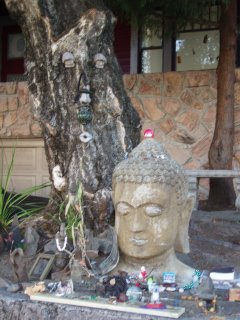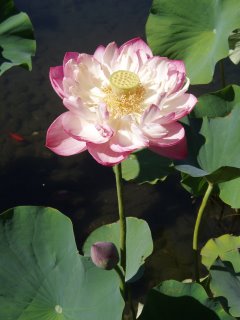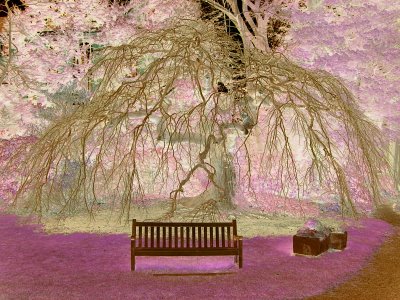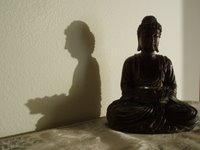I have a highly developed sense of order and symmetry. I have a very strong drive to systematize, to organize, to understand. At college, I was fully indoctrinated in the scientific method, spending 5 years hypothesizing, brainstorming, designing experiments, objectively observing, collecting and analyzing data, troubleshooting, proving or revising hypotheses. One might say that mine is a typically masculine mind.
And yet, I am also a 'feeler'. My senses are acute. My capacity for pleasure is boundless. I am conscious of things most people find beneath notice. Unless I am thinking deeply, I am aware, both physically and mentally, of every moment. My physical sensitivity to my environment, combined with a talent for systematizing, creates conflict and opportunity. I am (almost) always analyzing the output of my sensory array (the body), sifting, sorting, ranking, keeping the bewilderment of sensory bombardment at bay.
In my need to create order from chaos I am extremely aware that I use symbols (words) to describe my experience of life, and that the words I choose have nuances for others that are not present for me. The best example, I suppose, is that when I use 'sensual', people hear 'sexual'. And when I use words to describe my experiences, I am conscious that words are symbols ascribed to meanings, and that the world is so saturated with the meanings given to it that those meanings seem to reside in the things, people, and places themselves. I habitually assume that the world presented to me via my senses exists just as it appears to me. But that is preposterous, because what I sense is filtered through the unconscious mind. How I experience reality is coloured by the attitudes, conditioning, and habits of my emotional/psychological self long before it reaches the rational higher mind. In other words, the unconscious is tossing out the undesired variables so that the higher mind can do what it does best: create order out of chaos.
One of the benefits of meditation is that it brings me to the level of the unconscious, making me aware of all that 'white noise' it filters out for me. Breathing becomes something miraculous, really. I can feel my clothing touching my skin, my hair tickling my neck. I can hear the click of the freezer, the hum of the neighbor's TV, the sound of the river flowing by. The details of the moment flow one into the next and I am aware of the interconnectedness of things. My sense of myself deepens as well. I become conscious of my self-isolation, my insistence that I am this or that, my attachment to the idea of a fixed, 'core' self. As I breathe, as I 'listen' with all my senses to my body, to my environment, to my mind, it becomes oh so obvious that each moment is created out of the moment that preceeded it, and that I create myself in response to and interaction with my experiences, moment to moment. And it becomes oh so obivious that my responses are often conditioned by habit, by training, by the systems I have created, so that in my daily life, I am not really living today, I am experiencing a slight reconfiguration of the past.
Which is very comfortable and convenient, even predictable. It is much easier to think of conditions and consequences as 'things' with their own intrinsic (and manipulatable) identities, rather than as processes with no independent reality of their own. The reality is that no matter how much I want to make things singular, straightforward, absolute, and ordered, life is a matrix, a complex flow of interconnected processes. It is fractal, ambiguous, fluid, dynamic, imminent, transient, intertwined, unpredictable, and immediate. And I have choices as to how I respond to this reality. I can respond with fear, with the desire to create a mental map based upon past experiences that I can use as an overlay for present and future contingencies, thus shaping my perceived reality to suit an increasingly brittle, inflexible, habit-bound self which feels less and less comfortable with change.
Thus, the kind of 'order' that we humans create engenders tension. While it is natural to our ego, it is unnatural to our self. The ego is the 'I', the false-core, the part of us that denies change, denies unpredictability and impermanance. The ego clings to habitual behaviours and routines as a means to secure a sense of 'self', of wo we are, distinct from others; whereas the true self is comfortable developing the integrity of our identities aswirl in the transient, ambiguous, continually transforming world, knowing our selves as integral parts of a dynamic, inter-related whole, and thus free to create our reactions and ourselves moment to moment, letting reality teach us, instead of shaping our perceptions of it to fit inside our nice and tidy psychological boxes.
And the tension is more obvious to those of us who rise to challenge unconscious self-absorbtion with contemplative inquiry. We can continually question the assumption of the immutable 'I' at the core of our experiences. We can compassionately query ourselves about the validity of the emotionally charged notions we have of others. We can objectively observe our reactions to people and situations, examining the appropriateness of our responses to determine if we reacted to what actually occurred, or if we acted habitually, out of our preconceptions. And we can undermine the order of things with the responsive echos to these questions. Once we have gone to all the effort to put something in order, the last thing we want is for something to change. And so it is that even the seekers and the askers find themselves fighting against the habitual resistance to change.
In sum, order is not the enemy. The universe has its order. But neither is chaos something to be reviled. It is causal and creative; it provides opportunities for growth and spontanaeity that would otherwise be denied. There is always a tug between the two, between order and chaos, and tension in the minds of humans who want nothing more than to abolish the one in favor of the other.
Labels: desire, essay, fear, meditation, pleasure, river, sensuality, uncertainty

















